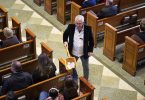
by Gina Christian
PHILADELPHIA (CNS) — Recovery from the church’s abuse crisis also can be a challenge for those working on the front lines with victims and for Catholics simply trying to live out their faith.
Although dioceses now have standard procedures in place for conducting background checks, providing safe environment training and promptly reporting allegations and cooperating with civil authorities along with providing victim reparations, the less obvious needs are those who help the victims, said a clinical ethics consultant at the Brooklyn Hospital Center in New York.
“Humans are by nature social creatures,” said Joel Warden, who is also a scholar in residence at St. Francis College in Brooklyn. “We feel the good and bad that others are going through.”
Such trauma can manifest itself in multiple ways, he told CatholicPhilly.com, the news website of the Archdiocese of Philadelphia.
For those whose job it is to assist survivors, the details and damage of clerical abuse can result in “not even taking care of your own basic human needs,” said Leslie Davila, director of the Archdiocese of Philadelphia’s Office for Youth and Child Protection.
Davila, who has been a victim advocate for 20 years, said that support professionals can suffer from “not eating right, not sleeping well and worrying constantly about clients.” They also can lose interest in hobbies and other relaxing activities, she said, and may become “hypervigilant” with their own children.
“You’re walking around with this emotional residue, hearing their stories and being a witness to that pain, that fear and the trauma they’ve experienced,” she added.
Others who suffer from the crisis, although they may not have interacted with victims themselves are current or former Catholics who say they feel “abandoned, betrayed, angry, heartbroken and discouraged,” said Meghan Cokeley, director of the Archdiocese of Philadelphia’s Office for the New Evangelization.

Cokeley, who regularly delivers parish presentations on “The Role of the Laity in a Time of Crisis,” said that “the abuse scandals have deeply wounded many Catholics,” including “the most active and engaged.”
While she reserves the word “trauma” for victims and their families, Cokeley said that the church as a whole “needs to stop hiding behind lawyers and lawyered-up responses to people’s pain.”
By most assessments, true healing for victims and for the church as a whole will require a combination of personal and institutional change. Prevention and protection policies are crucial, said Davila.
“Moving forward means we can’t forget the past,” she said. “We have to honor survivors, and we have to continue to be vigilant.”
Davila — who said she works every day “to put [herself] out of a job” — encourages her staff members to attend to their health, reach out to others and set appropriate boundaries, including with their devices and social media accounts.
“You have to figure out how to unplug,” she said.
Davila said the wounded church itself, and the faith on which it rests, can be the source of healing.
“Working within the context of the Catholic Church could challenge faith, but I think it is also the opportunity to strengthen it,” she said. “I remember that this work [of helping victims] is what I was put on this earth for; it’s my ministry and my mission.”
Warden pointed to the Eucharist as “a channel” through which Catholics can come to terms with, and triumph over, human suffering.
“The Eucharist is our regular entering into traumatic events in the life of Jesus, his passion and death, and the transcending of that trauma in his resurrection,” he said.
Full institutional reform “will probably take decades,” said Cokeley, and will depend on “the authenticity of our conversion in these matters.”
She stressed that “the deeper issue is the reform of our hearts and deep conversion to Jesus Christ,” especially among church leadership.
At the same time, healing for the church’s wounds — both open and hidden — can be closer than we think, she said, since it happens “heart by heart” when people “radiate the goodness and tenderness of Jesus Christ.”
“That kind of healing can be immediate,” said Cokeley. “We should never underestimate the power of Christ.”
Copyright ©2020 Catholic News Service / U.S. Conference of Catholic Bishops.






